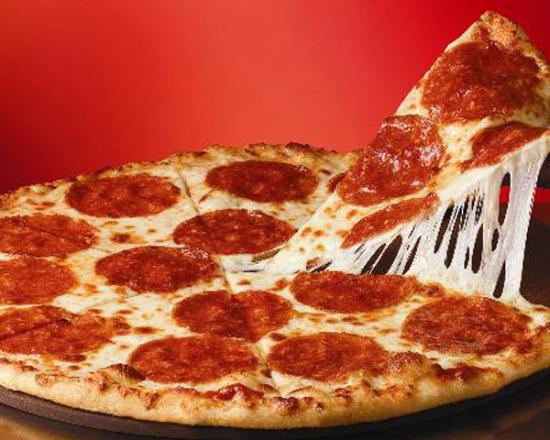Lose Weight Eating Pizza
Did you know that you can lose weight by eating nothing but pizza? It sounds outright crazy, but it’s true, which is good news if you’re a carb lover.
There’s a bunch of lore on the internet claiming that carbs are “bad” for you and will make you fat. Unfortunately, many people listen to this terrible advice and not only miss out on delicious foods but never max out their potential in the gym.
Eating foods that are carb-friendly not only taste amazing, but they’re important for your muscles.
Find out below which foods we recommend you eat to lose at least 20 pounds in the next 2 months.
The Truth About Weight Loss
Contrary to the popular belief that carbs “make you fat,” weight loss is a lot simpler than that. Weight loss comes down to energy in vs. energy out. Simply put, if you consume more calories than you burn, you’ll gain weight, and if you burn more calories than you consume, you’ll lose weight (1).
In fact, this professor went out of his way to prove that you can lose weight on a “Twinkie” diet (such a jarring way to lose weight I know) and lost 27 pounds in two months!
The Different Macronutrients
The human body gets its energy from food, which is made up of a few different macronutrients: protein, fats, and carbohydrates. Your body needs macronutrients for growth, energy, and other body functions. All three of these macronutrients are important for your body to function properly, and they each play a role.
Macronutrients
- Carbs – Carbohydrates are your body’s primary source of energy. Without carbs, your body would feel lethargic.
- Protein – The building blocks of muscle; its main function is to grow and repair muscle tissue.
- Fats – Aside from making your food taste better, fats are essential for the production of hormones, insulation, and protecting your vital organs.
To maintain a healthy body, you’ll want to eat a good mix of all three of these nutrients.
Carb-up with Complex Carbohydrates
Of course, the most delicious foods you can think of are made up of mainly carbohydrates, including cake, chips, burgers, fries, and yes, even bodybuilder’s favorite cheat meal – pizza! If it tastes amazing, it likely contains a good chunk of carbohydrates. Needless to say, these are processed foods and you’ll want to limit how many of these types of carbs you intake for health reasons (even if you can only eat candy and lose weight).
Although the tastiest foods are made of carbs, so are a lot of healthy foods. Heck, even fruits are mainly carbs.
Carbohydrates are made up of fiber, starch, and sugar, and there are simple carbs and complex carbs. Fiber and starch are complex carbs, while sugar is a simple carb. Complex carbs are “healthy” carbs. They’re nutrient-dense, satiating, and replenish your body. That’s because they’re high in fiber and digest slower.
Also, if you happen to be a diabetic, then you’ll want to stick to complex carbs since they control glucose levels.
Simple carbs are the tasty carbs. They don’t contain near as many nutrients like complex carbs, and they usually require a fair amount of calories to feel full and satisfied. Plus, they tend to make you feel lethargic. That’s not to say all simple carbs are bad – fruits are simple carbs, but they’re rich in vitamins and minerals.
Simple Carbs
- Pizza
- Fries
- Soda
- Breakfast cereal
- Cookies
Complex Carbs
- Brown rice
- Oatmeal
- Peas
- Beans
- Sweet potatoes
Although you can eat both simple and complex carbs to lose weight, we recommend that 80% of your diet comes from complex carbs and allow room for 20% of your diet to come from simple carbs from your favorite foods.
How Many Carbs Should You Eat?
The number of carbohydrates you eat will vary for each individual, depending on your anthropometrics (weight and body fat) and activity level. Typically, you’ll want your diet to be 45-60% carbs.
To lose weight, you’ll want to opt for carbs that are filling and light in calories. As you learned, you can eat whatever you want and still lose weight, but it’s not recommended. Not only will your overall health suffer, but you’ll remain ravenous throughout the day since you’ll need to indulge in a lot of processed food to feel full, and those calories rack up.
Instead, swap the donuts for sweet potatoes, whole grains, fruit, and lentils. These are nutrient-dense and low in calories. And if you want to indulge in a healthy snack, try popcorn. Not only is popcorn amazing, but it’s high in volume and fiber, and when a food is high in volume and fiber, it fills you up quicker off fewer calories.
How Much Weight Should You Lose Each Month?
Depending on the total amount of weight you have to lose will vary the amount of weight you should lose each month. If you have more body fat and weight to lose, you’ll be able to get away with losing more weight each month.
However, in general, it’s recommended that you lose 1.5 – 2 lbs a week. Most experts agree that those who lose weight slow and steady are more likely to keep it off (2). That means you can lose at least 16 pounds in 2 months, but likely more if you’re dedicated and have a lot of weight you want to lose.
To lose 20 pounds or more in 2 months, you’ll want to strive to lose at least 2.5 pounds a week. If you’re following a good training program and eating the right foods, that’s more than doable for most people!
The key is to stick to mostly complex carbohydrates and put your body in an energy deficit.
The Importance of Carbs for Building Muscle
Besides the noticeable drop in energy you’ll feel if you avoid carbs completely, you’ll also have a hard time building muscle. That’s because your muscles are fueled with glycogen, the energy for your muscles. I’ll spare you all the scientific mumbo jumbo, but when your body breaks down the foods you eat, it gets converted into glucose (blood sugar), which is then stored in your muscles as glycogen.
And guess where you get the magical effects of glycogen from? That’s right – carbohydrates!
Without glycogen, your workout performance will suffer and you won’t maximize muscle growth (3).
Other Benefits of Carbs
Now you know some of the benefits carbs have to offer, but there are some others worth mentioning. Did you know that carbohydrates can keep your testosterone levels high?
In this study, those who were on a high-carbohydrate diet had higher T levels and lower cortisol levels than those on a low-carbohydrate diet (4).
Also, since carbohydrates are high in fiber, they aid in digestion and control your cholesterol. Since carbohydrates are your body’s energy source, they’re paramount for your brain, kidney, heart, and CNS.
Moreover, carbs can help relax you since they increase your serotonin levels, which acts as an antidepressant and improves your mood (5).
Recap
Unfortunately, the web is suffocated with a bunch of misleading information surrounding carbs. Carbs won’t make you fat, calories will.
Carbohydrates are essential for muscle growth and for your body to function properly. Plus, it doesn’t hurt that most mouthwatering foods are loaded with carbs. As long as most of the carbs you eat are complex carbs, you’ll be able to have your cake and eat it too.
Click the social links below to share this with any carb haters you know!
References
1 – Strasser, B., Spreitzer, A., & Haber, P. (2007). Fat loss depends on energy deficit only, independently of the method for weight loss. Annals of nutrition & metabolism, 51(5), 428–432. https://doi.org/10.1159/000111162
2 – Paisey, R. B., Frost, J., Harvey, P., Paisey, A., Bower, L., Paisey, R. M., Taylor, P., & Belka, I. (2002). Five year results of a prospective very low calorie diet or conventional weight loss programme in type 2 diabetes. Journal of human nutrition and dietetics : the official journal of the British Dietetic Association, 15(2), 121–127. https://doi.org/10.1046/j.1365-277x.2002.00342.x
3 – Ivy J. L. (2004). Regulation of muscle glycogen repletion, muscle protein synthesis and repair following exercise. Journal of sports science & medicine, 3(3), 131–138.
4 – Anderson, K. E., Rosner, W., Khan, M. S., New, M. I., Pang, S. Y., Wissel, P. S., & Kappas, A. (1987). Diet-hormone interactions: protein/carbohydrate ratio alters reciprocally the plasma levels of testosterone and cortisol and their respective binding globulins in man. Life sciences, 40(18), 1761–1768. https://doi.org/10.1016/0024-3205(87)90086-5
5 – Wurtman, R. J., & Wurtman, J. J. (1995). Brain serotonin, carbohydrate-craving, obesity and depression. Obesity research, 3 Suppl 4, 477S–480S. https://doi.org/10.1002/j.1550-8528.1995.tb00215.x










